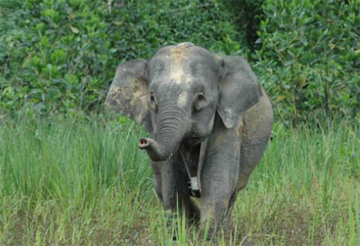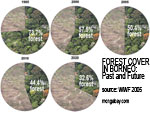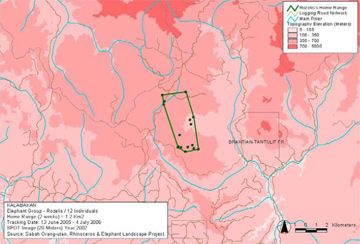Rare pygmy elephants endangered by logging in Borneo
Rare pygmy elephants endangered by logging in Borneo
mongabay.com
August 8, 2007
Pygmy elephants are increasingly threatened by logging and forest conversion for agriculture in their native Borneo, reports a new satellite tracking study by WWF.
Researchers report that the preferred habitat for these dwarfed elephants — flat, lowland rainforests and river valleys — are some of the most sought after by developers. More than 40 percent of the total forest cover in the Malaysian state of Sabah on the island of Borneo has been lost to logging, plantation development, and settlement.
“The areas that these elephants need to survive are the same forests where the most intensive logging in Sabah has taken place, because flat lands and valleys incur the lowest costs when extracting timber,” said Raymond Alfred, Head of WWF-Malaysia’s Borneo Species Programme.
“However, the Malaysian government’s commitment to retain extensive forest habitat throughout central Sabah, under the Heart of Borneo agreement, should ensure that the majority of the herds have a home in the long term.”
 © WWF / A. Christy Williams. Rozelis with the collar the day after.
|
The Heart of Borneo initiative — agreed upon in early 2007 by the three governments that control Borneo — seeks to conserve 240,000 square kilometers of contiguous forest on Borneo.
The new study, which WWF says is the largest ever using satellite collars on Asian elephants, “suggests that pygmy elephants prefer lowland forests because there is more food of better quality on fertile lowland soils.”
“Satellite tracking is clearly one of the most effective ways of obtaining information on wild elephants in Sabah because they spend so much time inside the forest,” said Mahedi Andau, Director of the Sabah Wildlife Department. “We now have a good idea of the home range, size and location of some individual elephant herds.”
The study found there are “probably not more than 1,000” pygmy elephants remaining in Sabah, which is home to about two-thirds of Borneo’s elephant population. A reserves in Kalimantan — the Indonesian part of Borneo — appears to be small and too fragmented to support a viable population for the long term.
WWF says that while elephants can survive in sustainably logged forests they will not persist in oil palm plantations, currently one of the greatest threats to Borneo’s rainforests.
Satellite Tracking of Borneo’s Pygmy Elephants -June 2005 — June 2006 PDF
Related articles
Borneo
(2/22/2007) Borneo, the third largest island in the world, was once covered with dense rainforests. With swampy coastal areas fringed with mangrove forests and a mountainous interior, much of the terrain was virtually impassable and unexplored. Headhunters ruled the remote parts of the island until a century ago. In the 1980s and 1990s Borneo underwent a remarkable transition. Its forests were leveled at a rate unparallel in human history. Borneo’s rainforests went to industrialized countries like Japan and the United States in the form of garden furniture, paper pulp and chopsticks. Initially most of the timber was taken from the Malaysian part of the island in the northern states of Sabah and Sarawak. Later forests in the southern part of Borneo, an area belonging to Indonesia and known as Kalimantan, became the primary source for tropical timber. Today the forests of Borneo are but a shadow of those of legend and those that remain are highly threatened by the emerging biofuels market, specifically, oil palm.
Coal mining threatens the “Heart of Borneo”
(7/25/2007) Coal mining in Borneo imperils the island’s fast-disappearing forests and threatens to undermine the effectiveness of an monumental conservation initiative, according to a report from the The Sunday Times and Parliamentary testimony.
 |
Experts: Borneo in urgent need of protection
(5/23/2007) A prominent group of 1500 scientists in over 70 countries have called for the urgent conservation of Borneo’s forests, which are fast-disappearing on the southeast Asian island due to logging, fires, and conversion for oil palm plantations.
 |
Scientists capture video of rare Borneo rhino
(4/24/2007) WWF has captured video footage of the rare Borneo rhino. There are only 25-50 of the rhino left in the wild on the island. Video from a camera trap shows the animal eating, walking to the camera and sniffing the equipment. It is first time the beast’s behavior in the wild has been captured on film.
This article is based on a news release from WWF
